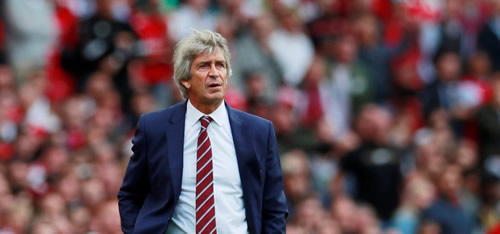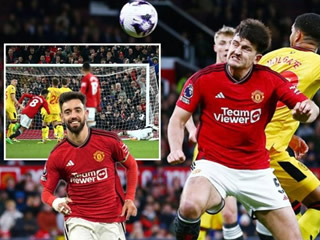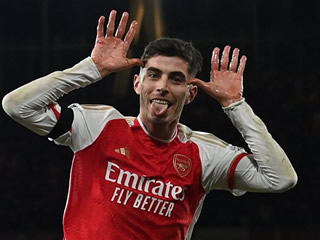West Ham suffering the consequences of PellegriniŌĆÖs push for revolution instead of evolution
’╗┐Posted Friday, August 31, 2018 by Footballfancast.com

When Mark Hughes took over at Stoke in summer 2013, he promised evolution instead of revolution. Although his time in Staffordshire ended unceremoniously halfway through last season, it was the smart call; he slowly turned a Tony Pulis team into Stokalona without upsetting the balance of a club that had lofty ambitions but inevitably could never shake the underlying fear of relegation - at least until his final few months in charge.
The Potters became famed for an exciting, mercurial and undeniably talented front three of Bojan, Xherdan Shaqiri and Marko Arnautovic, but it was only after two seasons of top half finishes that this trio were assembled in summer 2015.
During his first term at the Bet365 Stadium, the now-West Ham front-man was the only member of it to be brought in. Rather, Hughes was still relying on the likes of Jonathan Walters, Marc Wilson, Glenn Whelan and Peter Crouch - more rudimentary, agricultural and gritty players he'd inherited from Pulis. Nonetheless, over the course of three seasons Hughes improved Stoke's league position and the style of play simultaneously.
Fast forward five years, and Manuel Pellegrini finds himself inheriting a similar situation at West Ham - a club that has finished between 10th and 13th during five of the last six seasons and was put under pressure by the fan-base to return to the West Ham way of playing. He'll be expected to make the Irons a more competitive side, but also bring more entertainment to the London Stadium.
David Moyes is by no means as extreme in his philosophical views as Pulis, and the Irons were by no means as attritional as Stoke once were as they sought survival last season. But we're still talking about a group of players and a club that served four seasons under Sam Allardyce, that often turned to defensive tactics under Slaven Bilic and employed Moyes to play in a relegation-threatened manner during a relegation-threatened campaign. Old habits die hard.
But in contrast to Hughes' insistence on slow and steady progression, Pellegrini has opted for the shock doctrine. Over £93million's worth of talent was brought in during the summer, a club-record transfer fee was spent on a new attacking midfielder in Felipe Anderson, the entire emphasis of West Ham's game-plan has changed from protecting their own goal to creating problems for the opposition's and even the structure of the starting XI has been altered too.
While most West Ham fans will be pleased with the quality of performance so far, which has steadily improved with every game under Pellegrini, results tell us it's already proving too much change too soon. The Irons have conceded on average three goals a game in the Premier League and are yet to pick up their first point of the season. Pellegrini has always been an idealist, and perhaps there's weight to the argument that the fastest route of adapting is by jumping in at the deep end.
But for such an experienced manager, it's surprising that there's been hardly any room for compromise considering opportunities to do so have been available to him. What's less surprising, is how much West Ham have struggled defensively.
After all, we've seen it countless times before in the Premier League; a new manager replaces a defensive one and demands the team open up to play with greater ambition and optimism. Quality and confidence lacking though, the floodgates quickly open - which is what West Ham are experiencing right now.
Perhaps that's why the club brought in almost an entirely new backline during the summer, including the goalkeeper behind and the defensive midfielder in front, but their lack of familiarity and the bizarre insistence on a high line has only exacerbated those problems.
And once again, it's not as if Pellegrini's hand has been completely forced here. Although some changes in defensive personnel were clearly necessary after last season, they didn't all need to take place in an instant. Declan Rice, for example, was arguably West Ham's best defender last season - but he's started the new campaign as a squad option in midfield.
Angelo Ogbonna too was certainly amongst the Irons' more reliable centre-halves, but he was left out of the squad entirely last weekend for a tough trip to Arsenal. And then there's Arthur Masuaku - a brilliantly dynamic wing-back, a not so brilliant left-back. Surely Aaron Cresswell, a natural full-back who offers a compromise between offence and defence, would be a safer option to start the season with.
Pellegrini would of course argue that soon enough, all these awkward pieces will click together. But considering he could have slowly transitioned these players in and out of the team over the course of not only this season but also the ones to come, just like Hughes did at Stoke City, it feels worryingly naive in light of not only how competitive the Premier League now is but more pertinently West Ham's daunting fixture list.
Before the end of November, they will have faced all of last season's top nine - teams readily capable of punishing West Ham's disorganised, unfamiliar and often high-pressing defence - so by the time the Irons get used to the Pellegrini way, the high line and the new personnel, their season may have already regressed into yet another relegation battle.
Pellegrini is no doubt a fantastically talented manager, whose way of playing has no doubt proved fantastically successful for much of his career. But the manner in which he's tried to bring instant change to east London has lacked the smartness and shrewdness West Ham need.
Even Pep Guardiola, albeit working from a philosophical foundation much closer to his own, didn't transform Manchester City's way of playing over the course of one pre-season - the benefits were felt the campaign after after a yearof transition.
And the problem with revolution is that, by design, it's a short-term construct - a moment of sudden, drastic, violent and intended-to-be-irreversible change. Evolution though, can take its time, right its own wrongs, give itself breathing space to choose the right course of action. Pellegrini and West Ham feel like a good fit, but maybe it's time for Pellegrini to take a few steps back before the Irons go marching on once again.
Photos
More»Meet Jude Bellingham's stunning girlfriend Laura
Thursday April 25 2024[PICTURE SPECIAL] Man Utd 4 - 2 Sheffield United
Thursday April 25 2024[PICTURE SPECIAL] Arsenal 5-0 Chelsea
Wednesday April 24 2024




Your Say